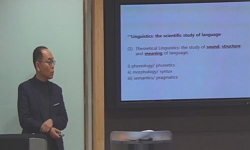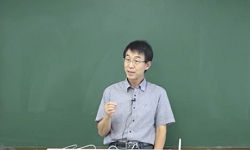Linguistic studies of Korean language have hitherto concentrated to mainly theoretical problems, and, as a result, made few contribution to natural language processing. For the sake of tagging task, the more elaborated system of parts-of-speech is req...
http://chineseinput.net/에서 pinyin(병음)방식으로 중국어를 변환할 수 있습니다.
변환된 중국어를 복사하여 사용하시면 됩니다.
- 中文 을 입력하시려면 zhongwen을 입력하시고 space를누르시면됩니다.
- 北京 을 입력하시려면 beijing을 입력하시고 space를 누르시면 됩니다.
https://www.riss.kr/link?id=A77030511
- 저자
- 발행기관
- 학술지명
- 권호사항
-
발행연도
2006
-
작성언어
Korean
- 주제어
-
등재정보
KCI등재
-
자료형태
학술저널
- 발행기관 URL
-
수록면
97-122(26쪽)
-
KCI 피인용횟수
8
- 제공처
- 소장기관
-
0
상세조회 -
0
다운로드
부가정보
다국어 초록 (Multilingual Abstract)
Linguistic studies of Korean language have hitherto concentrated to mainly theoretical problems, and, as a result, made few contribution to natural language processing. For the sake of tagging task, the more elaborated system of parts-of-speech is required, and linguists need to pay more attention to probabilistic knowledge or heuristic. For parsing and word sense disambiguation, large-scale database, e.g. corpora and electronic dictionaries containing argument structures of verbs and semantic classes of nouns, is required. It is nice that recently these linguistic resources are built on the base of governmental fund. In spite of these projects, linguits need to make more efforts in order to provide natural language processing with practically more useful linguistic information.
목차 (Table of Contents)
- 1. 국어 연구의 실용적 목적
- 2. 형태소 분석과 국어 연구
- 3. 구문 분석과 국어 연구
- 4. 단어 의미 중의성 해소와 국어 연구
- 5. 맺음말
- 1. 국어 연구의 실용적 목적
- 2. 형태소 분석과 국어 연구
- 3. 구문 분석과 국어 연구
- 4. 단어 의미 중의성 해소와 국어 연구
- 5. 맺음말
- 참고문헌
- 영어 초록
참고문헌 (Reference)
1 강승식, "한국어 형태소 분석과 정보검색" 홍릉과학출판사 2002
2 강범모, "한국어 명사 의미 부류 체계의 구축과 활용" 한국인지과학회;한국정보과학회 247-251, 2001
3 박진호, "의존문법에 기반한 한국어 구문분석기의 설계와 구현(한국어 정보화와 구문분석)" 도서출판 월인 287-323, 2004
1 강승식, "한국어 형태소 분석과 정보검색" 홍릉과학출판사 2002
2 강범모, "한국어 명사 의미 부류 체계의 구축과 활용" 한국인지과학회;한국정보과학회 247-251, 2001
3 박진호, "의존문법에 기반한 한국어 구문분석기의 설계와 구현(한국어 정보화와 구문분석)" 도서출판 월인 287-323, 2004
동일학술지(권/호) 다른 논문
-
- 국어국문학회
- 김미영(Kim Mee-Young)
- 2006
- KCI등재
-
- 국어국문학회
- 김동건(Kim Dong-Keon)
- 2006
- KCI등재
-
- 국어국문학회
- 신광철(Shin Kwang-Cheol)
- 2006
- KCI등재
-
- 국어국문학회
- 최형용(Choi Hyung-Yong)
- 2006
- KCI등재
분석정보
인용정보 인용지수 설명보기
학술지 이력
| 연월일 | 이력구분 | 이력상세 | 등재구분 |
|---|---|---|---|
| 2020 | 평가예정 | 계속평가 신청대상 (등재유지) | |
| 2015-01-01 | 평가 | 우수등재학술지 선정 (계속평가) | |
| 2011-01-01 | 평가 | 등재학술지 유지 (등재유지) |  |
| 2009-01-01 | 평가 | 등재학술지 유지 (등재유지) |  |
| 2007-01-01 | 평가 | 등재학술지 유지 (등재유지) |  |
| 2004-01-01 | 평가 | 등재학술지 선정 (등재후보2차) |  |
| 2003-01-01 | 평가 | 등재후보 1차 PASS (등재후보1차) |  |
| 2002-01-01 | 평가 | 등재후보학술지 유지 (등재후보1차) |  |
| 1998-07-01 | 평가 | 등재후보학술지 선정 (신규평가) |  |
학술지 인용정보
| 기준연도 | WOS-KCI 통합IF(2년) | KCIF(2년) | KCIF(3년) |
|---|---|---|---|
| 2016 | 0.79 | 0.79 | 0.75 |
| KCIF(4년) | KCIF(5년) | 중심성지수(3년) | 즉시성지수 |
| 0.72 | 0.72 | 1.376 | 0.3 |




 DBpia
DBpia







